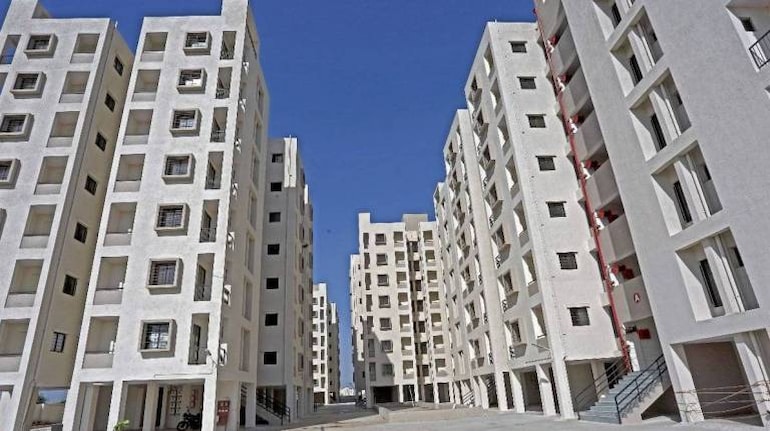



Ahmedabad has emerged as the most affordable housing market in India among the metropolitan cities in 2020, with an affordability ratio of 24 percent, Knight Frank Affordability index says.
The western metropolitan is followed by Pune and Chennai in the affordable housing market category with affordability ratio of 24 percent each. Meanwhile, financial capital Mumbai continues to be the most expensive market, with affordability ratio of 61 percent.
"Ahmedabad is among the most affordable residential markets among the eight cities under our coverage and developer margins have been thin here for a very long time," Knight Frank Affordability index says.
Central Bank of India to exit housing finance business; to sell JV stake for Rs 160 croreHowever, the metro has also been adversely impacted by the ongoing slowdown in sales in the Indian residential market. The COVID-19 pandemic that struck in full force during Q2 2020 has only exacerbated an already dire situation.
The real estate developers say the pandemic in H1 2020 has pushed developers to negotiate more aggressively with potential buyers on price and payment terms to sustain sales levels. This has caused the average price level to drop 2 percent YoY in H1 2020. The residential pricing in H1 2020 in Ahmedabad ranged between Rs 1,000-6,000 depending upon the area.
Among the eight metros, NCR was the worst affected market with sales and new launches capitulating 73 percent and 82 percent YoY, respectively during H1 2020. NCR’s share of launches and sales nosedived from 7 percent to 2 percent and from 15 percent to 9 percent YoY, respectively during H1 2020 compared to H1 2019.
Sales in traditionally end-user markets like Bengaluru and Hyderabad also fell sharply by 57 percent and 43 percent YoY, respectively during H1 2020, while Kolkata registered 37 percent YoY growth in units launched. NCR, Chennai and Hyderabad had near-zero sales during Q2 2020 while developers were forced to postpone launches across markets due to labour unavailability and the well anticipated drop in demand.
However, Mumbai continued to lead in terms of share of launches and sales in H1 2020 at 39 percent and 31 percent respectively during H1 2020 compared to H1 2019.
"After two years of stagnant albeit steady demand, total sales in the eight markets under our coverage fell by a massive 54 percent YoY to a decadal low of 59,538 units during H1 2020. New launches also fell the most in H1 2020 compared to any period during this decade at 46 percent, to 60,489 units," the survey said.
Stating the situation in the affordable office market category, the survey mentioned that the transactions in H1 2020 fell by a massive 37 percent YoY to 1.6 mn sq m (17.2 mn sq ft), the steepest in a decade. Demand fell the most in Pune and NCR markets at 47 percent and 45 percent, respectively, while the Mumbai transaction volumes fell by a comparatively modest 17 percent YoY due to two big-ticket leases totalling 0.17 mn sq m (1.8 mn sq ft) that amounted to almost half of Mumbai’s total transactions and salvaged an otherwise disastrous period. Even Bengaluru and Hyderabad office market transactions fell by 42 percent and 43 percent, respectively.
Bengaluru accounted for almost 56 percent of the space surrendered during H1 2020. Kolkata and Ahmedabad which are the smallest and relatively less established markets among the eight under review saw vacancy level jump the most, by 9 and 8 percentage points YoY respectively to 41 percent and 42 percent by the end of H1 2020. The comparatively steep fall in transactions compared to new completions caused the vacancy level, of the eight markets combined, to move up significantly from 12.7 percent in H1 2019 to 14.1 percent in H1 2020.
"2019 was already a tough year with low economic growth and palpable slowdown in business activity over multiple years. GDP growth of 4.2 percent in FY 2020 was the slowest in 11 years and in such a fragile economic environment came the COVID-19 crisis. We believe a combination of best in decade affordability level and pick-up in the economy will serve as key catalysts for the country’s housing market next year," Knight Frank India Chairman Shishir Baijal said.
Discover the latest Business News, Sensex, and Nifty updates. Obtain Personal Finance insights, tax queries, and expert opinions on Moneycontrol or download the Moneycontrol App to stay updated!
Find the best of Al News in one place, specially curated for you every weekend.
Stay on top of the latest tech trends and biggest startup news.